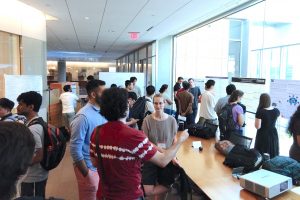UW–Madison to Continue Fundamental Data Science Research with Phase II Award from NSF
University of Wisconsin–Madison data scientists are harnessing big data and laying the foundations for major advances in data-rich applications thanks to a five-year, $4.6 million grant from the National Science Foundation.
The team at UW–Madison is co-leading a cohort of institutions to study the theoretical underpinnings of the rapidly growing field of data science. The Institute for the Foundations of Data Science (IFDS) — with partners at the University of Washington, the University of California, Santa Cruz, and the University of Chicago — is being funded by a $12.5 million Phase II grant from NSF’s Transdisciplinary Research in Principles of Data Science (TRIPODS) program. $4.6 million is slated for UW–Madison.
The funding will support interdisciplinary trainees in the growing field and help IFDS scientists perform the fundamental work required to advance data science innovations across fields like machine learning, artificial intelligence, and optimization.

Stephen Wright
As interest in big data’s powerful applications continues to skyrocket, data scientists are recognizing the importance of the underlying foundations of fields that rely on increasingly large data sets. “With all of the excitement and activity that’s happening in artificial intelligence and other areas, it’s important to stay connected to the fundamental areas of math, statistics, and computer sciences,” says Professor of Computer Sciences Stephen Wright, who directs IFDS at UW–Madison and is a Discovery Fellow at the Wisconsin Institute for Discovery.
Neural networks, for example, are computing structures that can perform complex tasks like recognizing images in self-driving car systems. But neural networks rely on extracting meaningful information from enormous quantities of data, a process that requires sophisticated algorithms.
“Those algorithms have to be founded in principles from math and statistics,” says Wright. “You have to have an understanding at a mathematical level of how these algorithms work, why they behave the way they do, and how they can be improved.” By investigating problems at the fundamental, theoretical level, data scientists can learn about both the limitations and the possibilities of data-driven systems.
“We hear every day how data science is revolutionizing industries, businesses, health care systems, education, and so on,” says Professor of Electrical and Computer Engineering Robert Nowak, who serves on the IFDS site committee and is also a Discovery Fellow at WID. “The algorithms fueling this revolution didn’t pop into existence overnight; they are the culmination of more than a century of mathematical inquiry into data analysis. IFDS continues this tradition by tackling new mathematical challenges at the forefront of modern data science.”

Faculty, students, and staff gather at the 2018 IFDS Summer School poster session. / Photo: Stephen Wright.
UW–Madison’s IFDS was established in Phase I of NSF’s TRIPODS program in 2017 with a $1.5 million grant. Since then, Wright and his collaborators at UW–Madison and beyond have built interdisciplinary teams of data scientists, created an infrastructure for sharing ideas, and forged new partnerships that are accelerating the exploration of new approaches to the formulation and solution of problems in data analysis.
A strategic partnership with the Phase I TRIPODS team at the University of Washington was also established in 2017 in anticipation of expansion in the next phase. “Our partnership during Phase I laid the foundation for Phase II of IFDS,” says Maryam Fazel, professor of electrical and computer engineering at the University of Washington, who is principal investigator of IFDS Phase II. “We are excited about building on this relationship, together with our new partners at UC, Santa Cruz and the University of Chicago.”
“During Phase I, IFDS has been incredibly effective at stimulating fruitful collaborations across departments,” says Sebastien Roch, professor of mathematics and member of the IFDS executive committee. “Further expanding these efforts beyond UW–Madison will open up exciting new opportunities for interdisciplinary advances in data science.”
In addition to establishing a new formal partnership with the other three universities, the five years of support for Phase II includes funding for new projects and workshops and support for additional research assistants and trainees co-mentored by faculty from different departments. The IFDS award is one of two NSF Phase II TRIPODS awards totaling $25 million. The TRIPODS program is connected to NSF’s Harnessing the Data Revolution Big Idea program, which “aims to accelerate discovery and innovation in data science algorithms, data cyberinfrastructure, and education and workforce development.”
NSF director for the Division of Mathematical Sciences, Juan Meza, says in a statement, “with NSF’s $25 million investment, these interdisciplinary teams will be able to tackle some of the most important theoretical and technical questions in data science.”









